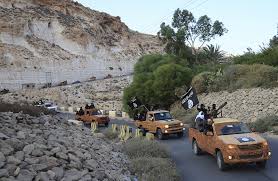Rabat-The U.S. strategy to combat terrorism in North Africa has practically been extended with the Pentagon’s announcement on 1st of August that the army has launched its first air strikes over regions under ISIS’ control. But, the scene of the strikes in Libya that reminds us of the military movement that has kicked off on 23 September against ISIS in Syria and Iraq does not mean that Western powers have the same view on the organization’s expansion in a dismantled country that lacks a unified political authority and is laden with dozens of embattling armed groups.
Apparently, Obama’s administration has been aware of these political and military complications on earth. Therefore, it has counted since 2013 on empowering the intelligence sector. It also used diplomacy to maintain its vital interests in Libya along with combating terrorism that has moved from Iraq and Syria, by urging the parties of the conflict to negotiate and to find a political solution that put an end to the political and military chaos that benefit ISIS is feeding on to expand.
As part of its strategic goals in combating terrorism in the Middle East and North Africa, the United States maintains its right to implement “special operations” and to practice intelligence activities independently from the International Coalition. On another side, Obama’s administration trains, arms, and supports the Iraqi army, the Kurdish Peshmerga, and some of the Syrian opposition’s factions.
In the Libyan case, these U.S. attacks against ISIS are not the first unless regarding the coordination with the National Unity Government. The Pentagon previously announced the launch of many strikes against terrorists’ strongholds in June 2015 and February 2016.
The Pentagon’s statement said that President Barack Obama has approved the strikes against ISIS in Libya based on recommendations from Ashton Carter, the secretary of Defense and Joseph Dunford, chairman of the Joint Chiefs of Staff and considering that these strikes in Sirte will lead the government to achieve a strategic and decisive advancement. For his part, Jonathan Winer, State Department’s special envoy for Libya posted on Twitter that his country will not participate in the ground operations saying that the USA does not plan to combat ISIS on the ground.
However, the U.S. administration has been maintaining a strong coordination with the National Unity Government in Libya and is helping it by providing it with data concerning activities of terrorist groups and by launching air strikes against ISIS.
On the other hand, the U.S. air strikes go far beyond a direct confrontation with terrorism and carry many political indications. They reveal some conflicts among the regional and international powers regarding the complicated situation in Libya. The U.S. initiative which has gained the consent of Libyan Prime Minister Fayez al-Sarraj and followed remarkable conflicts between the Libyan government and France, Britain, and Italy, is still unable to control the situation.
While the Libyan government defends the United States’ intervention in the country, it condemns the French operations and considers them as a sensitive case, which shows that the combat of terrorism has been transformed into a conflict among foreign parties and countries.
Forhis part, Sarraj told CNN Arabia that his government aims at eradicating ISIS and added that his country should not be left alone facing this enemy.
Eventually, we can say that the coordination between the United States and the Libyan government regarding the combat of terrorism serves the supreme interest of the U.S. administration in the region. Therefore, Washington has rushed to play the role of the real warrior of terrorism and at the same time, it has enjoyed a legitimacy of action from a U.N.-supported government, unlike the French forces.
